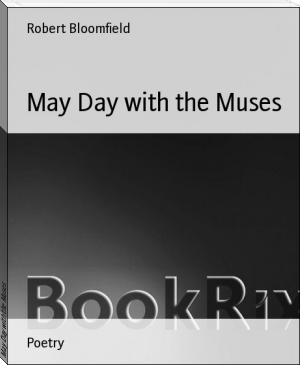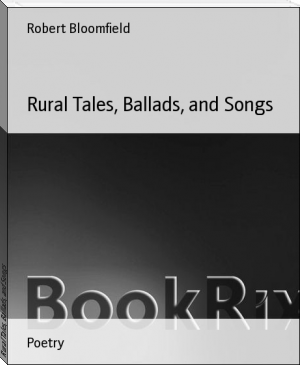May Day with the Muses by Robert Bloomfield (mobile ebook reader .txt) 📖

- Author: Robert Bloomfield
Book online «May Day with the Muses by Robert Bloomfield (mobile ebook reader .txt) 📖». Author Robert Bloomfield
"To se-se-see us come;--
"But I have taken care of both,
"And brought them bo-bo-both safe home."
With Andrew vex'd, of Mary proud,
But prouder of her boy,
She kiss'd them both, and sobb'd aloud,--
The children cried for joy.
But what a home at last they found!
Of comforts all bereft;
The fire out, the last candle gone,
And not one penny left!
But Caleb quick as light'ning flew,
And raised a light instead;
And as the kindling brands he blew,
His father snored in bed.
No brawling, boxing termagant
Was Ellen, though offended;
Who ever knew a fault like this
By violence amended?
No:--she was mild as April morn,
And Andrew loved her too;
She rose at daybreak, though forlorn,
To try what love could do.
And as her waking husband groan'd,
And roll'd his burning head,
She spoke with all the power of truth,
Down kneeling by his bed.
"Dear Andrew, hear me,--though distress'd
"Almost too much to speak,--
"This infant starves upon my breast--
"To scold I am too weak.
"I work, I spin, I toil all day,
"Then leave my work to cry,
"And start with horror when I think
"You wish to see me die.
"But _do_ you wish it? can that bring
"More comfort, or more joy?
"Look round the house, how destitute!
"Look at your ragged boy!
"That boy should make a father proud,
"If any feeling can;
"Then save your children, save your wife,
"Your honour as a man.
"Hear me, for God's sake hear me now,
"And act a father's part!"
The culprit bless'd her angel tongue,
And clasp'd her to his heart;
And would have vow'd, and would have sworn,
But Ellen kiss'd him dumb,--
"Exert your mind, vow to _yourself_,
"And better days will come.
"I shall be well when you are kind,
"And you'll be better too."--
"I'll drink no more,"--he quick rejoin'd,--
"Be't poison if I do."
From that bright day his plants, his flowers,
His crops began to thrive,
And for three years has Andrew been
The soberest man alive.
Soon as he ended, acclamations 'rose,
Endang'ring modesty and self-repose,
Till the good host his prudent counsel gave,
Then listen'd all, the flippant and the grave.
"Let not applauses vanity inspire,
"Deter humility, or damp desire;
"Neighbours we are, then let the stream run fair,
"And every couplet be as free as air;
"Be silent when each speaker claims his right,
"Enjoy the day as I enjoy the sight:
"They shall not class us with the knavish elves,
"Who banish shame, and criticise themselves."
Thenceforward converse flow'd with perfect ease,
Midst country wit, and rustic repartees.
One drank to Ellen, if such might be found,
And archly glanced at female faces round.
If one with tilted can began to bawl,
Another cried, "Remember Andrew Hall."
Then, multifarious topics, corn and hay,
Vestry intrigues, the rates they had to pay,
The thriving stock, the lands too wet, too dry,
And all that bears on fruitful husbandry,
Ran mingling through the crowd--a crowd that might,
Transferr'd to canvas, give the world delight;
A scene that WILKIE might have touch'd with pride--
The May-day banquet then had never died.
But who is he, uprisen, with eye so keen,
In garb of shining plush of grassy green--
Dogs climbing round him, eager for the start,
With ceaseless tail, and doubly beating heart?
A stranger, who from distant forests came,
The sturdy keeper of the Oakly game.
Short prelude made, he pointed o'er the hill,
And raised a voice that every ear might fill;
His heart was in his theme, and in the forest still.
THE FORESTER.
Born in a dark wood's lonely dell,
Where echoes roar'd, and tendrils curl'd
Round a low cot, like hermit's cell,
Old Salcey Forest was my world.
I felt no bonds, no shackles then,
For life in freedom was begun;
I gloried in th' exploits of men,
And learn'd to lift my father's gun.
O what a joy it gave my heart!
Wild as a woodbine up I grew;
Soon in his feats I bore a part,
And counted all the game he slew.
I learn'd the wiles, the shifts, the calls,
The language of each living thing;
I mark'd the hawk that darting falls,
Or station'd spreads the trembling wing.
I mark'd the owl that silent flits,
The hare that feeds at eventide,
The upright rabbit, when he sits
And mocks you, ere he deigns to hide.
I heard the fox bark through the night,
I saw the rooks depart at morn,
I saw the wild deer dancing light,
And heard the hunter's cheering horn.
Mad with delight, I roam'd around
From morn to eve throughout the year,
But still, midst all I sought or found,
My favourites were the spotted deer.
The elegant, the branching brow,
The doe's clean limbs and eyes of love;
The fawn as white as mountain snow,
That glanced through fern and brier and grove.
One dark, autumnal, stormy day,
The gale was up in all its might,
The roaring forest felt its sway,
And clouds were scudding quick as light:
A ruthless crash, a hollow groan,
Aroused each self-preserving start,
The kine in herds, the hare alone,
And shagged colts that grazed apart.
Midst fears instinctive, wonder drew
The boldest forward, gathering strength
As darkness lour'd, and whirlwinds blew,
To where the ruin stretch'd his length.
The shadowing oak, the noblest stem
That graced the forest's ample bound,
Had cast to earth his diadem;
His fractured limbs had delved the ground.
He lay, and still to fancy groan'd;
He lay like Alfred when he died--
Alfred, a king by Heaven enthroned,
His age's wonder, England's pride!
Monarch of forests, great as good,
Wise as the sage,--thou heart of steel!
Thy name shall rouse the patriot's blood
As long as England's sons can feel.
From every lawn, and copse, and glade,
The timid deer in squadrons came,
And circled round their fallen shade
With all of language but its name.
Astonishment and dread withheld
The fawn and doe of tender years,
But soon a triple circle swell'd,
With rattling horns and twinkling ears.
Some in his root's deep cavern housed,
And seem'd to learn, and muse, and teach,
Or on his topmost foliage browsed,
That had for centuries mock'd their reach.
Winds in their wrath these limbs could crash,
This strength, this symmetry could mar;
A people's wrath can monarchs dash
From bigot throne or purple car.
When Fate's dread bolt in Clermont's bowers
Provoked its million tears and sighs,
A nation wept its fallen flowers,
Its blighted hopes, its darling prize.--
So mourn'd my antler'd friends awhile,
So dark, so dread, the fateful day;
So mourn'd the herd that knew no guile,
Then turn'd disconsolate away!
Who then of language will be proud?
Who arrogate that gift of heaven?
To wild herds when they bellow loud,
To all the forest-tribes 'tis given.
I've heard a note from dale or hill
That lifted every head and eye;
I've heard a scream aloft, so shrill
That terror seized on all that fly.
Empires may fall, and nations groan,
Pride be thrown down, and power decay;
Dark bigotry may rear her throne,
But science is the light of day.
Yet, while so low my lot is cast,
Through wilds and forests let me range;
My joys shall pomp and power outlast--
The voice of nature cannot change.
* * * * *
A soberer feeling through the crowd he flung,
Clermont was uppermost on every tongue;
But who can live on unavailing sighs?
The inconsolable are not the wise.
Spirit, and youth, and worth, demand a tear--
That day was past, and sorrow was not here;
Sorrow the contest dared not but refuse
'Gainst Oakly's open cellar and the muse.
Sir Ambrose cast his eye along the line,
Where many a cheerful face began to shine,
And, fixing on his man, cried, loud and clear,
"What have you brought, John Armstrong? let us hear."
Forth stepp'd his shepherd;--scanty locks of grey
Edged round a hat that seem'd to mock decay;
Its loops, its bands, were from the purest fleece,
Spun on the hills in silence and in peace.
A staff he bore carved round with birds and flowers,
The hieroglyphics of his leisure hours;
And rough form'd animals of various name,
Not just like BEWICK'S, but they meant the same.
Nor these alone his whole attention drew,
He was a poet,--this Sir Ambrose knew,--
A strange one too;--and now had penn'd a lay,
Harmless and wild, and fitting for the day.
No tragic tale on stilts;--his mind had more
Of boundless frolic than of serious lore;--
Down went his hat, his shaggy friend close by
Dozed on the grass, yet watch'd his master's eye.
THE SHEPHERD'S DREAM: OR, FAIRIES' MASQUERADE.
I had folded my flock, and my heart was o'erflowing,
I loiter'd beside the small lake on the heath;
The red sun, though down, left his drapery glowing,
And no sound was stirring, I heard not a breath:
I sat on the turf, but I meant not to sleep,
And gazed o'er that lake which for ever is new,
Where clouds over clouds appear'd anxious to peep
From this bright double sky with its pearl and its blue.
Forgetfulness, rather than slumber, it seem'd,
When in infinite thousands the fairies arose
All over the heath, and their tiny crests gleam'd
In mock'ry of soldiers, our friends and our foes.
There a stripling went forth, half a finger's length high,
And led a huge host to the north with a dash;
Silver birds upon poles went before their wild cry,
While the monarch look'd forward, adjusting his sash.
Soon after a terrible bonfire was seen,
The dwellings of fairies went down in their ire,
But from all I remember, I never could glean
Why the woodstack was burnt, or who set it on fire.
The flames seem'd to rise o'er a deluge of snow,
That buried its thousands,--the rest ran away;
For the hero had here overstrain'd his long bow,
Yet he honestly own'd the mishap of the day.
Then the fays of the north like a hailstorm came on,
And follow'd him down to the lake in a riot,
Where they found a large stone which they fix'd him upon,
And threaten'd, and coax'd him, and bade him be quiet.
He that couquer'd them all, was to conquer no more,
But the million beheld he could conquer alone;
After resting awhile, he leap'd boldly on shore,
When away ran a fay that had mounted
 The unity of form and content is what distinguishes poetry from other areas of creativity. However, this is precisely what titanic work implies.
The unity of form and content is what distinguishes poetry from other areas of creativity. However, this is precisely what titanic work implies. 




Comments (0)